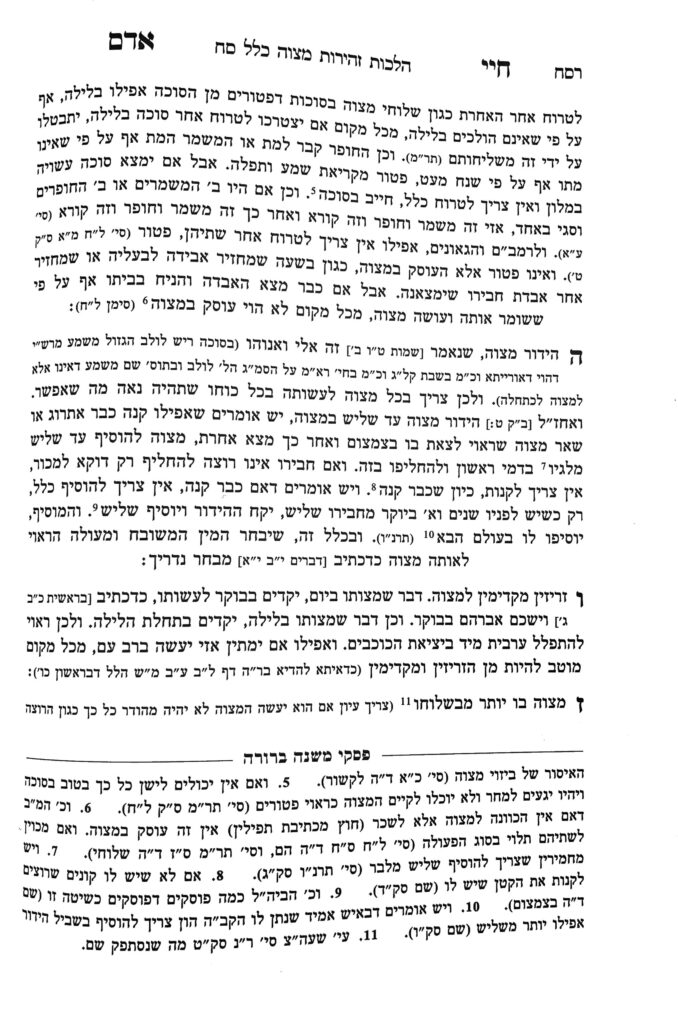We are continuing in siman 4, discussing the concept of oseik bmitzvah patur min hamitzvah. We learned that according to the Ritva, the chiddush of the pasuk which teaches oseik bmitzvah patur min hamitzvah is to teach that one should not leave mitzvah A to perform mitzvah B, even if mitzvah B is a mitzvah overes. In his first pshat, he suggested that the chiddush of the pasuk is to teach that when one has the option between two mitzvos, they do not have reshus to do as they wish, but should continue with the mitzvah they have already begun.
It is mashmah that Rashi disagrees with this answer. It appears from Rashi that one would have permission to leave mitzvah A to perform mitzvah B if mitzvah B is a mitzvah overes. Thus, for example, if one is reciting krias shema (a mitzvah deoraysa) or birchos krias shema (a mitzvah derabanan), and an ani comes around collecting for tzedakah, one would arguably be exempt due to oseik bmitzvah patur min hamitzvah. If one wishes to give tzedakah nonetheless, arguably it is efshar lekayeim shneyhem, but on the other hand, it certainly affects one’s davening. Even if one pauses from their davening, it may cause them to miss tefillah betzibur. Thus, it is not obvious that it will always be efshar lekayeim shneyhem. Under such circumstances, according to Rashi and Tosfos (who holds that when efshar lekayeim shneyhem, a person is not patur and must perform both[shiur 1392]), one may certainly interrupt. According to the Ritva, it appears that one should not interrupt. However, the minhag appears to be not in accordance with the Ritva.
We learned that in siman 38, the Shulchan Aruch writes that people involved in writing tefillin or other STA”M articles are considered oseik b’mitzvah, and therefore are patur from krias shema, tefillah and other mitzvos. The Mishnah Berurah points out that the Shulchan Aruch is discussing a situation in which one began writing before the zman chiyuv (of shema or whatever other mitzvah is in question), because once the zman for the mitzvah has come, a person should not begin writing STA”M, unless they estimate that they will finish writing before the zman for the other mitzvah will pass. The Mishnah Berurah would seem to indicate that once a person has begun writing, they cannot interrupt for the other mitzvah, which is why the Mishnah Berurah points out the significance of whether a person has started or not. This halacha would appear to be not like Rashi, who holds that one may interrupt one mitzvah for another.
If a person does interrupt mitzvah A for mitzvah B, one could argue that they fulfill mitzvah B, or one could argue that since they were patur from that mitzvah, it is considered a reshus and no longer a mitzvah for them. The Mishnah Berurah discusses this question in the halachos of achilas matzah (siman 475). He writes that if one is in the middle of actively taking care of a lost object, and concurrently eats matzah, they do fulfill their chiyuv to eat matzah. However, they should not make a bracha, because the Mishnah Berurah is unclear whether a person is actually chayav in the mitzvah, so it may be incorrect to say asher kideshanu bemitzvosav vetzivanu.
This question ties into the question of whether women can make a bracha on mitzvos in which they are not obligated. On the one hand, maybe they should not say the bracha because they are not commanded (and the language of the bracha says vitzivanu, “that He commanded us,); on the other, since there are members of Klal Yisroel who are commanded, they may say it. This question is a machlokes Rishonim, and comes down to a machlokes in practice between Sephardim and Ashkenazim.
Practically, we conclude that it is not appropriate for one to interrupt mitzvah A to fulfill mitzvah B. however, if a person does so, they will fulfill the mitzvah.
Regarding the question of giving tzedakah during davening, if the individual collecting is the ani himself, there is an issur of al tashev dach nichlam, not to refuse someone asking, which adds a lo saasei to the question. We will discuss the relationship between a lo saasei and asei in the next shiur, be’ezras Hashem.
Summary
Tosfos and the Ran argue whether oseik bmitzvah patur min hamitzvah applies when efshar lekayeim shneyhem. However, all agree that if there is absolutely no tircha involved in performing the second mitzvah, one is chayav to perform both.
If one has already begun mitzvah A, they should not interrupt to perform mitzvah B, even if mitzvah B is a mitzvah overes. If a person does interrupt mitzvah A for mitzvah B, they fulfill the mitzvah, but should not make a bracha on it.



